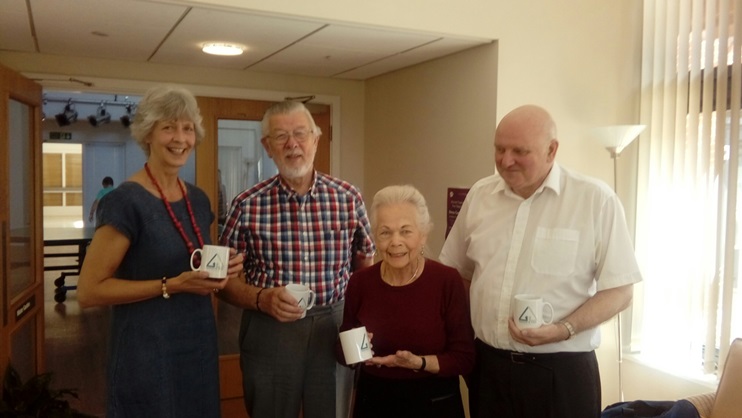Research
Getting involved with Alzheimer’s Society Research Network
Dr Anne Davidson Lund, an Alzheimer’s Society Research Network volunteer, explains why she signed up and what the role involves.

Dr Anne Davidson Lund (left) with other members of the Namaste Care public involvement panel (David Scott, Dr Gladys Archer and Ted Thorley)
My father had Alzheimer’s and we received such magnificent support from the Society that I wanted to give something back. Chatting with the volunteer co-ordinator at Alzheimer’s Society, we agreed that my professional research background sat best with the Research Network. Now my godmother has dementia, so the personal link continues.
I started by reviewing applications for research funding online (posted forms are also available). The initial training and induction sessions were a good way to discover more about the Society and meet people from head office. Periodically, I offer comments to help researchers improve their applications before they apply for grants, or join discussions with academics preparing an application.
As with all other network members, I bring my personal experience of dementia to the role – in my case as a carer for my father, and now my godmother. I have a good understanding of the challenges faced by the research community and an acute sympathy for people living with dementia and their carers.
Being part of the Research Network means I’m well informed about research relating to dementia. It gives me access to accurate facts and figures to use in discussion, and to inject balance into conversations about media stories, which are so often inaccurate. I’m about to train as a Dementia Friends Champion too.
In the spring, I was invited to join the Society’s care, services and public health grant advisory panel. We meet twice a year to review funding applications together. The time commitment is modest and quite flexible. An occasional face-to-face meeting, wherever it may be, is easy to accommodate and offers a chance to fit in social and cultural activities alongside.
In March 2015, Lancaster University approached Alzheimer’s Society to find people with experience of dementia to help apply for funding. Two of us from the Research Network offered to help and lead the project’s public patient involvement (PPI) element. Funding was secured from the National Institute for Health Research’s Health Technology Assessment programme.
The project is a feasibility study to see whether it’s possible to collect evidence on the effectiveness of Namaste Care, a method to improve end-of-life care for people with advanced dementia. Our PPI brief is to comment on the research as it progresses and ask for any clarification we feel is needed, advise on communications with people with dementia and their carers, and assist with dissemination and evaluation.
We have current knowledge of practice in care settings and can ground the academic theory of care research in the reality of care practice. We are well placed to suggest what is likely to be possible, which can save time, effort and money. And as we’re not intimately engaged in the research, we can stand back and call attention to the more general but equally important aspects of the work, such as making sure the findings are shared widely.

